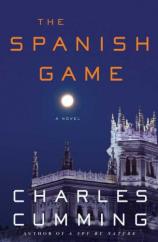The Spanish Game
Review
The Spanish Game
Alec Milius has spent the last six years of his life in exile in
Madrid in a near constant state of paranoia. He searches his
apartment for bugs, takes different routes to his favorite haunts,
and checks his rear view mirror for tails. He never finds anyone
listening or looking or following, yet as a spy who was
unceremoniously kicked out of England’s famous MI5 and MI6
espionage divisions, old habits die hard. He even wonders if
they’re trying to reel him back in. He has grown accustomed
to a life of relative peace and leisure, yet has moments of wanting
to be back “in the game” and is certain that his role
in getting two other agents killed has left him permanently out in
the cold.
Saul, a former MI5 colleague, turns up unexpectedly, looking for
a place to stay during his visit to Spain. He is the only person
who knows any details about the reasons Alec was thrown out of the
service. Saul complains about how hard it was to find him and kids
him about being so paranoid, changing his cell phone number every
three weeks and adopting new email addresses. “It pisses me
off, Alec, and it annoys your mum.”
Saul teases him about the pseudonym he has adopted at a local
chess parlor. “You can’t call me Alec, here, Saul. The
people here know me as Patrick.” Saul assures him that after
9/11, nobody cares about what Alec did in the late 1990s. The world
has moved on, he tells Alec --- and he should too.
Alec is a fascinatingly flawed man, drinking too much, living in
a world created by his checkered past, and filling his hours
working part time as an investigator for a bank. His haunted
present is further complicated by his affair with his boss’s
wife. When his boss sends him deep into Basque Country to meet an
infamous well-known separatist and terrorist, Alec is suspicious
that his boss knows about the affair and is sending him on this
mission to get him killed. When the separatist goes missing and is
then found murdered, Alec is doubly convinced that he is at the
center of something he simply cannot pinpoint.
Author Charles Cumming has been compared to le Carre, Deighton
and Ludlum, the giants of Cold War spy thrillers. He served a brief
stint with Britain’s real Secret Intelligence Service in the
mid-1990s and is well grounded in how things can go awry in pursuit
of bad guys. With the end of the Cold War and the aging of the spy
thriller masters, spy page-turners came to a halt for want of plot.
With no double-dealing Russians or scheming Chinese to chase, what
was the point? Cumming proves that there is a rich new threat to
explore --- not in the form of plotting governments and
counter-espionage agencies, but in the ephemeral world of
terrorists who are more difficult to track and nearly impossible to
bring to justice.
Cumming portrays such a strong sense of place and atmosphere of
threatening watchfulness that we are pulled into Alec’s
paranoia almost against our will. Driving through arid, wild,
southern Spain, walking the rainy streets of Madrid, or creeping
through a darkened parking garage, the sense of impending danger
permeates the pages.
Reviewed by Roz Shea on January 23, 2011





